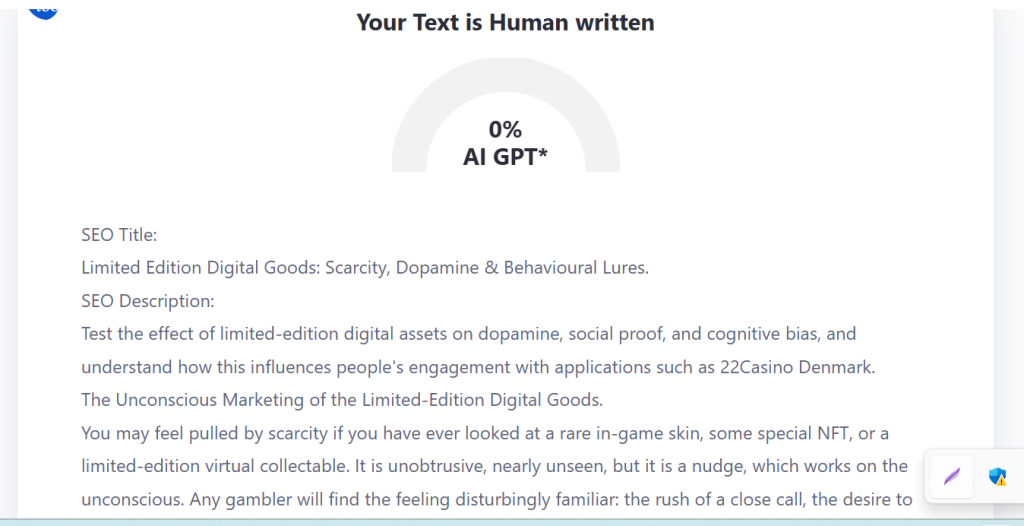
You may feel pulled by scarcity if you have ever looked at a rare in-game skin, some special NFT, or a limited-edition virtual collectable. It is unobtrusive, nearly unseen, but it is a nudge, which works on the unconscious. Any gambler will find the feeling disturbingly familiar: the rush of a close call, the desire to push another button, the dopamine circuits keeping you hooked. However, this time it is not about throwing dice or spinning reels; it is about possessing something electronic, unique, and fleeting.
There is not enough on the Psychology of Desire.
The scarcity has a very strong reaction in human beings. This phenomenon is known to psychologists as the scarcity heuristic: when an object is scarce, our brains tend to value it more highly. It is the same psychological trick that causes a limited version badge or symbol to seem so irresistibly special.
In the digital world, there is scarcity everywhere. Social networks, such as 22Casino Denmark, are not selling digital collectables, but rather the behavioural patterns they provide, including time-limited deals and exclusive bonuses, which resemble the mechanics of limited-edition digital items. The effect? Users get the feeling of urgency, which is almost automatic and contributes to instant gratification and online interaction.
Add the fear of missing out (FOMO), and the choice becomes even stronger. We are programmed to hate losing, and when an opportunity to claim something that is considered rare arises, the dopamine spike that follows may resemble winning a small jackpot.
Social Proof, Status Signaling.
Limited-edition objects do not merely attract scarcity — they also attract status. The possession of something that most people do not possess signifies taste, foresight or insider knowledge. On the Internet, this can be converted into digital bragging rights, such as avatars, skins, or NFTs that can be proudly displayed in a profile, akin to a high score on a casino leaderboard.
This is the social proof, as behavioural economists refer to it. When our peers like an item, we instinctively give it a higher value. The tiniest of clues, such as witnessing a friend purchase a rare digital item, may trigger a variable rewards loop, prompting us into engagement. The same dynamics play out in online gambling realms, such as 22Casino Denmark. When exclusive tournaments or VIP rewards are created, they create a sense of social status. However, the content itself is not about winning or losing money, but rather about engagement.
Brain Science: Neuroscience of Scarcity.
The magnetic power of limited-edition products is not purely psychological; it is also neurochemical in nature. The expectation of a rare reward activates the dopamine tracts in the brain, creating the same chemical stimulation as jackpot anticipation, without the need for a gamble. These dopamine loops can lead to behaviours such as repetitive checking, bidding, or even hoarding digital goods.
Cognitive biases support this loop. The effects of anchoring and comparison are that we overrate the rare item when compared to the more common alternative. Loss aversion is the reason that the possibility of missing out is more urgent than the pleasure of getting something banal. Together, all these mechanisms produce a strong, almost automatic urge to acquire, which does not always require deliberation.
Examples of the Digital Environment.
Casinos and Gaming Websites.
Although the relation to gambling is indirect, the mechanics are very similar. Online platforms utilize time-limited deals, exclusive benefits, and unique digital assets to foster engagement. For example of safe casinos with welcome package, 22Casino Denmark occasionally offers special promotions that replicate the essence of limited editions. The incentives are well-engineered to capture the attention of users while also not overstepping the area of responsible use, which is a behavioural nudge in the digital realm.
Cryptocurrencies, NFTs, and Game Collectables.
Beyond the casino, limited-edition tactics are the playground for gaming and NFT markets. The avatars, special skins, and NFTs are usually only available for a limited period, so users need to be quick. It shares a similar psychology to instant gratification in gambling: variable rewards, anticipation, and subtle social cues are all combined to produce high levels of engagement.
Expansive Digital Collectables.
Not only in games, but limited-edition digital products are also found in music, art, and virtual experiences. Exclusives are based on the same behavioural economics principles and exploit decision fatigue bias, social proof bias, and reward cycle dopamine cycles. To fans, these digital rarities are not only novel but also bring them a feeling of identity and control in a digital ecosystem.
Expert Insights
Behavioural economists and neuroscientists point out that these mechanisms are not inherently bad; they are merely taking advantage of our natural human behavioural tendencies. Decision fatigue, cognitive biases, and the dopamine loop characterize our daily psychology. According to experts, knowledge of these forces can transform passive involvement into informed involvement, whether it involves digital collectables or online gambling, as is the case with 22Casino Denmark. Being aware of the micro-cues in the game helps the user experience digital scarcity without succumbing to impulsive behavioural trends.






